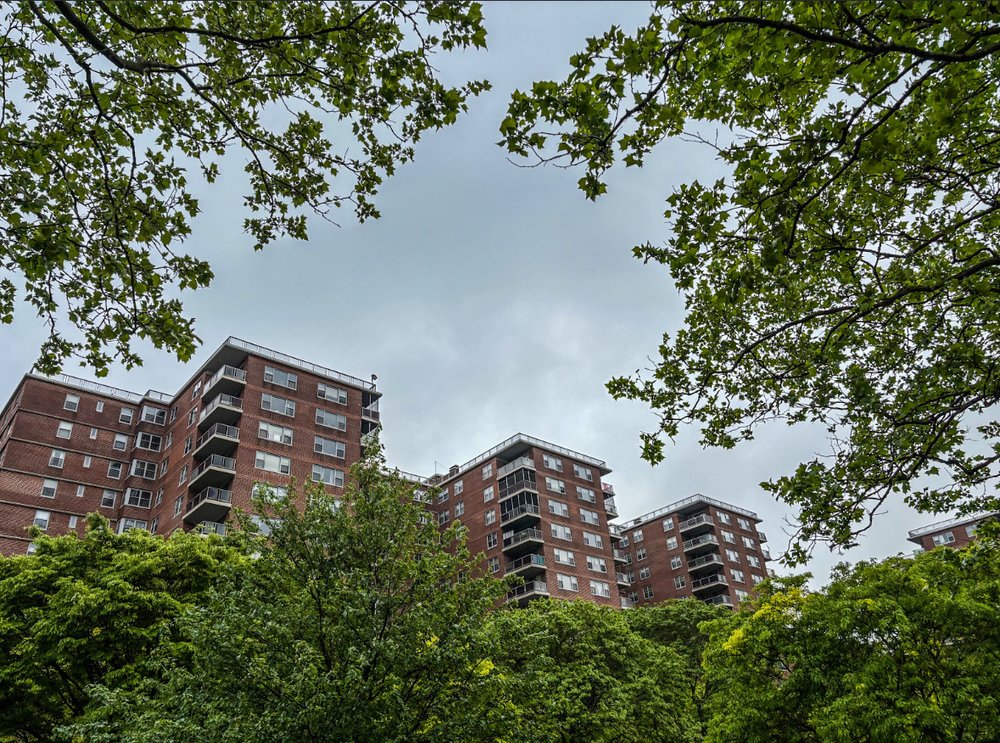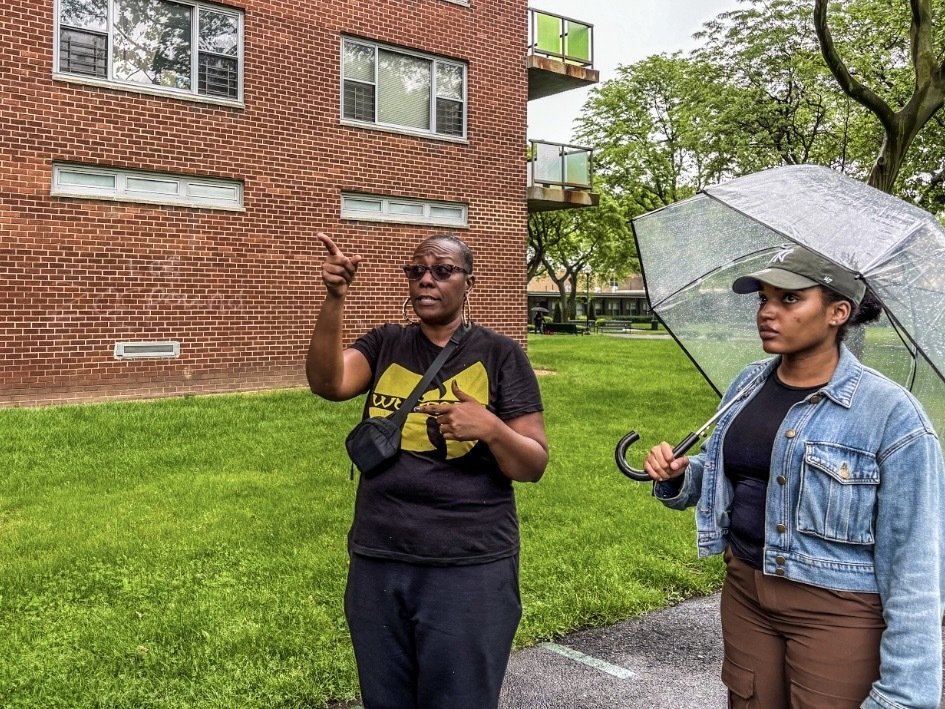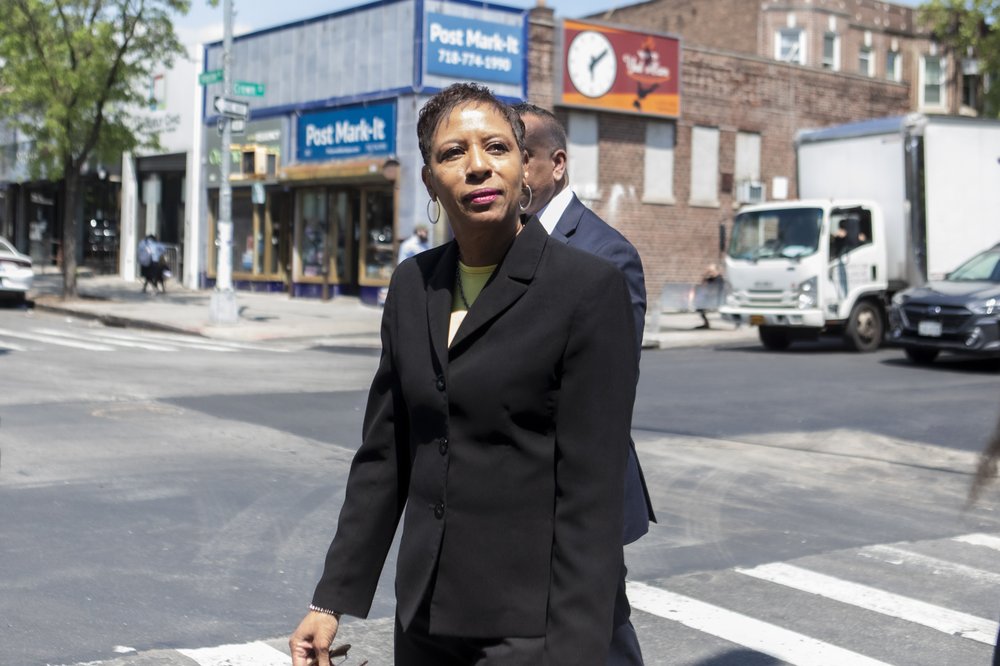This housing complex is home to 25K New Yorkers. Their costs are about to soar.
May 22, 2025, 6:30 a.m.
Residents of Rochdale Village are bracing for cost increases of at least 22%. Mitchell-Lama developments across the city face similar challenges.

At more than 120 acres, the Rochdale Village co-op complex in southeast Queens is big enough to fit four CitiFields inside its borders, with some room left over for a Little League diamond.
It’s home to 25,000 people, making it one of the largest complexes from a bygone era of affordable housing in New York City: Mitchell-Lama, a state program created in 1955 that targeted middle-class residents by placing income caps on those who can purchase an apartment and limiting how much units can be sold for. Rochdale Village residents typically pay no more than a $23,000 purchase price, followed by average monthly maintenance costs ranging from $1,000 to $1,800.
But those figures will soon spike as the complex faces financial headwinds shared by other Mitchell-Lama developments across the city. They include hefty debt payments, rising insurance rates, delayed upkeep that has only grown more costly and what many residents describe as bad decisions by an all-volunteer board of directors and its management company.
Rochdale Village is bracing for an $11.4 million shortfall next year, according to the co-op’s records. To make up the difference, its board of directors approved a 22.3% hike in monthly costs for residents in January. That decision is still pending approval from the state’s housing agency, which could force the co-op board to go even higher. Board members have considered proposals as high as 35% to pay for facade repairs and millions of dollars in unpaid water bills, among a litany of other expenses.
“It's just this nervousness. What am I to do?” said Imani Whitfield, a 27-year-old nursing student who lives with her sister in one of Rochdale Village’s 5,860 apartments. “We have to buy groceries. I have to buy school supplies. All of this costs money. And now a possible increase. How is it supposed to work?”

The Mitchell-Lama program, named for its two lead sponsors in the state Legislature, was meant to ensure long-term affordability. But the program hasn’t built a new development in New York City for over four decades. And for many of the 100,000 Mitchell-Lama units still left in New York City, that once-innovative source of affordable housing is becoming more costly. Tenants at Jaime Towers in the Bronx saw 40% increases in maintenance costs last year. Residents at Brooklyn’s Cadman Towers grappled with a 43% hike before opting out of Mitchell-Lama and into a different affordable housing program last year.
“This is happening in many [Mitchell-Lama] co-ops,” said Adele Niederman, president of the citywide organization Cooperators United for Mitchell-Lama. “Carrying charges are not going up 2% or 3% or 5%. They're going up 20%, 30% or 40%.”
Niederman said the increases are tough for most Mitchell-Lama residents to bear. Citywide, owners of Mitchell-Lama co-ops and other similar housing units that restrict resale profits had a median income of $77,000 — 40% lower than households of two typically earn in the New York City area — according to data from the city’s most recent housing survey.
Rochdale Village Board Chair Jean Hall referred questions from Gothamist to the development’s attorney, Dean Roberts. He called the 22.3% increase “the least bad option” among the proposals considered by the board, adding that the state’s housing agency, the Division of Homes and Community Renewal, could drive the figure even higher.
“At the end of the day, DHCR could tell us 38% if they wanted to,” Roberts said.
At a board meeting Monday, members said the agency has floated a potential 57% increase. Roberts said that was an example of a worst-case scenario but not a formal proposal.
Charni Sochet, a spokesperson for the housing agency, declined to comment on the complex’s pending application for cost increases, but said boards “have a fiduciary responsibility to ensure the financial integrity and self-sufficiency” of the co-op.
For some people, this is inheritance for their families.
Reaghan Smith, Rochdale Village resident
Summit Property Management runs day-to-day operations and handles capital projects at Rochdale Village. The board has blamed Summit for the decision to not pay the sprawling complex’s sizable water bill starting in late-2020. As a result, residents now owe the city $17.7 million in past-due bills and interest, according to the Department of Environmental Protection. On Monday, the board approved a search for a new property manager. Summit did not respond to multiple requests for comment.
Residents say they’re angry with both Summit and the board over the upcoming spike in their maintenance costs. But they also take issue with the state for letting financial problems at affordable co-ops like theirs balloon with little intervention.
“It’s egregious,” said Reaghan Smith, a mental health therapist who shares a three-bedroom apartment with her mother that they bought 12 years ago.
Smith, 50, said she worries many current residents will have to move out because they cannot afford the increases.
“ For some people this is inheritance for their families, so to see a lot of people have to uproot and leave, maybe they're not even going to be able to stay in New York,” she said.
John Ferretti, a subway train conductor who started the group Keep Rochdale Village Affordable with his wife Adena, said the price hikes mostly hurt working-class New Yorkers.
“ You're talking about state and city workers who keep this city and state running,” Ferretti said. “How dare the state turn their back on us?”
These issues are steamrolling through our Mitchell-Lamas citywide.
City Council Speaker Adrienne Adams
Their concerns echo calls from advocates and even many elected officials, who have urged the state to provide Mitchell-Lama co-ops with direct grants, low-interest loans and financial guidance to boards.
“It's probably one of the most successful programs in the state's history as a middle-income housing program,” state Assemblymember Harvey Epstein, a Manhattan Democrat, told state housing officials at a hearing last year. “It's kind of a bit of like the Wild West there, and I'm wondering why there isn't sufficient oversight now.”
DHCR Senior Vice President Becky Koepnick said most of the developments the agency oversees are on stable financial footing, but each is considered its own private company responsible for balancing its budget.
“All that remain under DHCR supervision are at least 45 years old and so, as expected, many have outdated building systems that need repairs, replacements and many have pressing physical needs,” she said.
Other Mitchell-Lamas are beset by serious mismanagement and even corruption. A 2024 report from the state comptroller’s office identified more than $1.6 million in mysterious or inappropriate payments at three co-ops overseen by the city’s housing agency.
In response to demands from lawmakers and co-op residents, the state is now hiring an expert consultant to provide financial and project guidance to boards.
City and state elected officials have also formed a task force to plot ways of preserving Mitchell-Lama developments. The task force includes Council Speaker Adrienne Adams, a Democratic mayoral candidate who represents Rochdale Village and who met with residents at a closed-door meeting Tuesday night.

“For some families it is going to be an astronomical challenge for them because this is not the affordability that they planned on and none of this is their fault,” Adams said of the upcoming maintenance cost increase in an interview with Gothamist. “These issues are steamrolling through our Mitchell-Lamas citywide.”
She said the Council is pushing for more financial assistance to Mitchell-Lamas in the city budget. The new state budget includes $110 million for capital improvements at Mitchell-Lamas in New York City and a provision to halve the property taxes that complexes in the program pay, known as shelter rent payments.
Residents have also urged Gov. Kathy Hochul to meet with them to discuss the problems facing Rochdale Village and other Mitchell-Lamas. A spokesperson for Hochul did not provide comment on the request or the complex’s financial difficulty.
Many Mitchell-Lama residents also qualify for city programs that freeze rents and maintenance costs for people with disabilities and seniors earning less than $50,000 a year.
About 530 residents of Rochdale Village used those programs last year, according to an annual state report. Others, like 81-year-old retired teacher Marva Henderson, earn just over the limit. Henderson said she has lived in her co-op for 48 years.
“ This sounds like it's extremely serious,” she said of the proposed maintenance increases.
Other residents say they’re still figuring out how they’ll make up the extra cost of housing.
“That's a big jump overnight. I know a lot of people can't swing that,” said Long Island Rail Road worker Chandra Worrell.
Worrell said she’s already cut out Netflix and other streaming services to save money and will now have to figure out other sacrifices.
“No fun things, I guess,” she said. “There goes my savings if it's all going toward rent.”
Housing could be on the ballot in NYC. Here’s what New Yorkers may be voting on. NYC’s rent-stabilized tenants face increase as high as 7.75% under preliminary board vote Real estate execs gave $400K to Cuomo’s PAC. NYC is suing them for building disrepair.